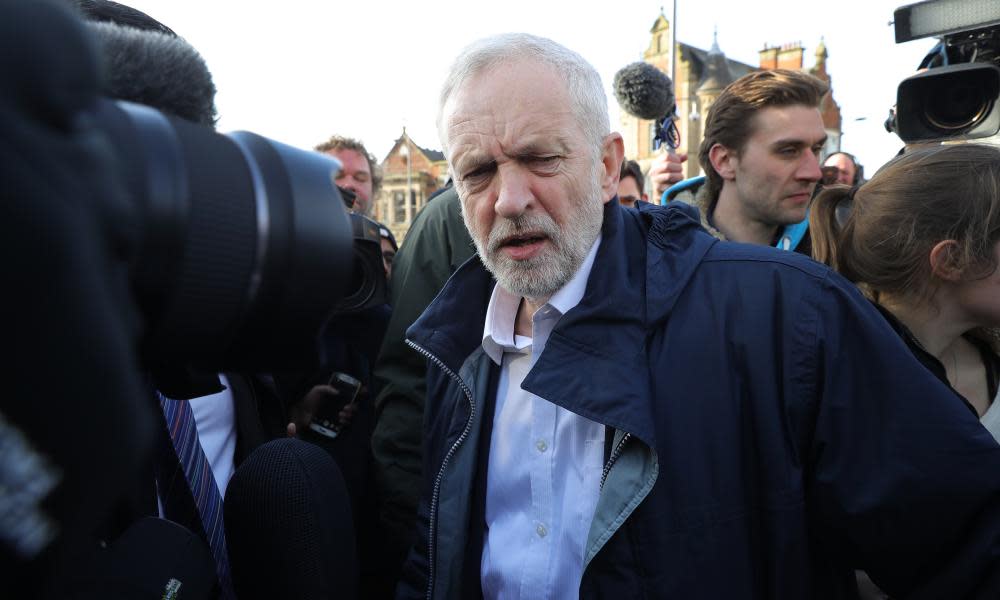Forget Copeland – what people want is a bigger, brighter, better Jeremy | John Crace

We happy fewer. Just hours after Labour had lost the safe seat of Copeland in a byelection, Jeremy Corbyn was in London to speak to the party of European Socialists at the Institute of Electrical Engineers. After the faintest ripple of applause had greeted his entrance, the Labour leader took the stage. Yes, things were catastrophic. But at least they weren’t serious. Sometimes losing was a sign you were winning.
Labour’s victory in Stoke-on-Trent Central had been a major triumph, he insisted. Now was the winter of our discontent, made glorious summer by this sun of Stoke. No other party could have held off the forces of darkness to hold on to a seat they had held since it was created in the 1950s. Today was a day to rejoice.
Nor should anyone be too downcast by the Copeland result. Just because voters in Cumbria would rather die from hospital closures than vote for Labour, there was no cause for concern.
It didn’t mean that Labour had got its message wrong. Just that the party had not got its message across clearly enough. Where there was confusion, let there be even greater confusion. What the voters wanted was more Jeremy. A bigger Jeremy. A brighter Jeremy. A better Jeremy.
“We can’t be the party of the 48%,” he insisted. “We have to be the party of the 100%.” Corbyn looked down at his fingers, momentarily aware there was something wrong with his maths. Right now, being the party of the 48% was something he could only dream about. The byelection results had suggested Labour was more like the party of the 25%. No matter, he consoled himself. Who really wanted the other 75% if they weren’t the right type of 75%? On Project Jeremy, there was no room for disbelievers. Doubt was the enemy of faith.
Next to go after his maths was his sense of direction. “The Tories are heading right, right and right again,” Corbyn said, which rather implied that the Tories were heading left. Theresa May would be horrified. With a bit more about bargain-basement honeypots, the Labour leader ended by insisting that he would make sure the Conservatives were listening to him. They were. And were loving everything they heard.
A lone man called Sergei rose to give him a standing ovation. The rest of the shadow cabinet remained looking glum in their front-row seats.
“Er ... thank you, Jeremy,” said the former chief whip Rosie Winterton, who had drawn the short straw of acting as intermediary in the question and answer session. “That was a brilliant ... um ... er ...” She scrabbled around searching for the right word. She settled on “vision”. Winterton neglected to say what it was a vision of. Moving on. “It’s Chris Ship’s last day as deputy political editor. Let’s take a question from him,” she said.
“What paper is he from?” whispered Corbyn.
Winterton looked astonished. “He’s from ITV,” she replied. And you’ve only been interviewed by him hundreds of times before. Corbyn continued to look blank. It had been a long night and he was feeling increasingly brittle.
“I want to ask you specifically about Copeland,” said Ship. “Since you found out that you’d lost a seat to the governing party for the first time since the Falklands war, have you at any point this morning looked in the mirror and asked yourself this question: ‘Could the problem actually be me?’”
“No,” said Corbyn.
“Why not?”
“Thank you for your question.”
“Let’s have another question, shall we?” said Winterton, anxious to broker a peace.
Ship stood his ground. “Why not?” he repeated. Corbyn closed his eyes, willing Ship to disappear. He didn’t. Ship tried a third time. “Why not?” Still nothing.
Eventually Winterton managed to end the deadlock by taking another question from the BBC. Again it was about Copeland. Why did everyone want to talk about that and not Stoke? It just wasn’t fair. It was wholly unreasonable to expect a leader to wonder if he was the right man for the job after such a triumphant night. Besides which, he didn’t have a mirror.
As he left the platform, Corbyn finally caught sight of his reflection. The seven ages of a Labour leader. Sans eyes. Sans teeth. Sans everything.

 Yahoo News
Yahoo News 
